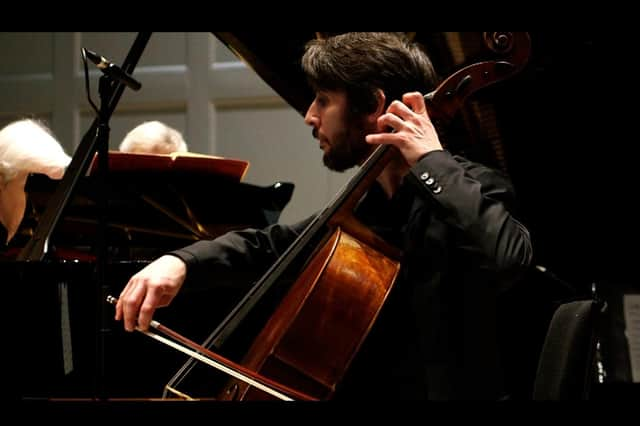Music reviews: Scottish Chamber Orchestra | Hippfest


It was just a year ago that, blindsided by the sudden, brutal lockdown and cancellation of live music-making, musicians were throwing solo, home-recorded performances up online with what felt like abandon. How far we’ve come since then. And while we might have lost something in moving away from those raw, authentic, warts-and-all videos, we’ve more than made up for it with sophistication, professionalism and – most importantly – ensembles seeing online as an opportunity, rather than simply a poor substitute for live performance.
None more so, arguably, than the Scottish Chamber Orchestra, which has been producing online concerts exploring diverse, little-known music, captured in expertly produced videos with illuminating close-ups on individual musicians and wonderfully clear, vibrant sound.
Advertisement
Hide AdAdvertisement
Hide AdJust take three chamber concerts from March – all of which are still available online (www.sco.org.uk/watch-at-home – but be quick: the first one disappears on 11 April). Piano quartets by Mozart and Fauré (*****) might have been at the more traditional end of the SCO’s offerings, but these were supple, sublime accounts from a quartet of SCO strings plus guest pianist Susan Tomes. And they were all the stronger for their restraint: the finale of Mozart’s K478 felt quite unassuming, and all the more human for that, and while there was a sense of power waiting to be unleashed throughout Fauré’s First Piano Quartet, it found its outlet in a gloriously exuberant conclusion. It was life-affirming stuff, captivating and moving.
The following week came four little-known but fascinating Eastern European pieces by Prokofiev, Kaprálová, Bacewicz & Shostakovich (****) that were revelatory when heard side by side. Prokofiev’s “Solo” Violin Sonata was performed with gusto (and pinpoint precision) by eight SCO violinists in unison (Prokofiev had always intended it as a teaching piece to be played by several violinists at once), while Shostakovich’s Two Pieces for string octet were full of energy and quicksilver changes of character. In between were the crisp, Janáček-meets-Poulenc neo-classicism of Vítězslava Kaprálová’s Wind Trio and the dashing Wind Quintet by Grażyna Bacewicz, which allowed all five of the SCO’s wind players their moments to shine.
March’s final SCO concert, Purcell, Reich, Pärt, Howard & Andriessen (*****), was a high-concept offering built around themes of rhythm and looping repetition, masterminded and introduced by SCO percussionist Louise Goodwin. And any concert that can make two elegant Purcell dances work alongside the raucous, radical, screamingly dissonant Workers Union by Louis Andriessen must be onto something. It was an arresting combination of pieces – which also took in Reich’s rippling Nagoya Marimbas and Pärt’s meditative Fratres – each of which shone an illuminating light on the others. Performances were impeccable – with Jan Waterfield’s harpsichord adding a deliciously old-school twang to Andriessen’s aural pummelling – and best of all, the SCO musicians seemed to be having a lot of fun too. A real highlight, challenging but deeply rewarding.
Just as eclectic – though in an entirely different genre – were the musical accompaniments in this year’s Hippodome Festival of Silent Cinema, reborn as an online event, and more ambitious than ever. Among the highlights were pianist Mike Nolan’s gently oriental, remarkably fluid improvised music for Grass (****), about the migration of the nomadic Bhaktiari people in Iran, a score that nicely captured the awe and wonder of the stunning 1925 documentary. The Frame Ensemble on violin, cello, piano and percussion delivered a brilliantly effective musical commentary on the 1929 Marlene Dietrich thriller The Woman Men Yearn For (*****), so persuasively argued that it was hard to believe they were making it up on the spot. And US jazz musicians Taylor and Cameron Graves supplied a lavish score to accompany 1926 Mary Pickford vehicle Sparrows (****), whose sumptuous washes of electronics provided a compelling contrast with the grimness and grime of a film about abandoned children.
As we (hopefully) begin to emerge from the worst of the pandemic, we’ll be returning to live performances with joy and relief – but we might also hope that the richness and effectiveness of all that’s been achieved online in the past year won’t be entirely left behind.
A message from the Editor:
Thank you for reading this article. We're more reliant on your support than ever as the shift in consumer habits brought about by coronavirus impacts our advertisers.
If you haven't already, please consider supporting our trusted, fact-checked journalism by taking out a digital subscription at https://www.scotsman.com/subscriptions